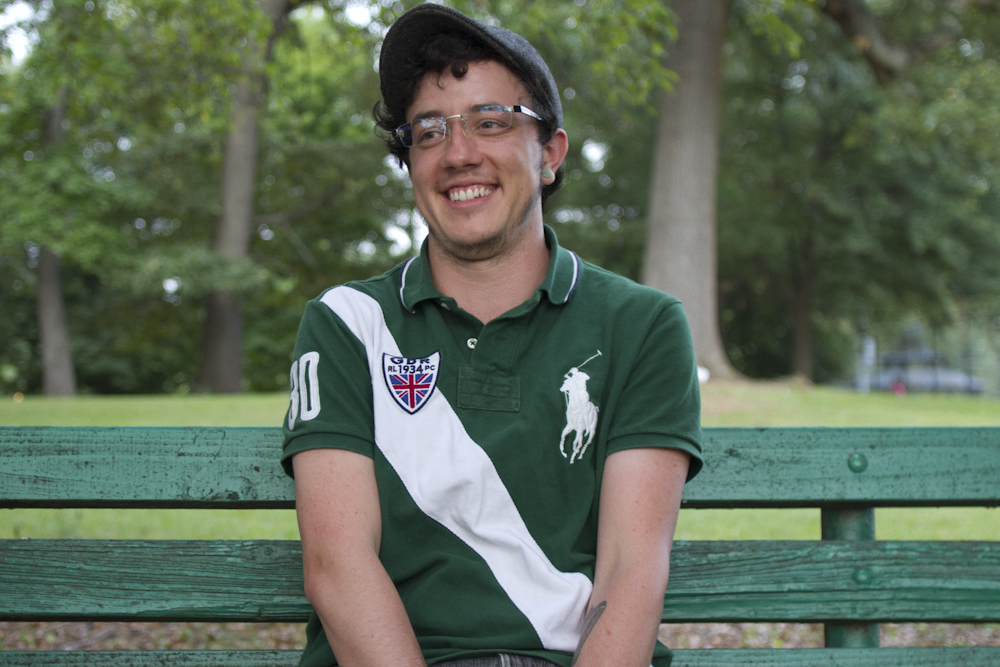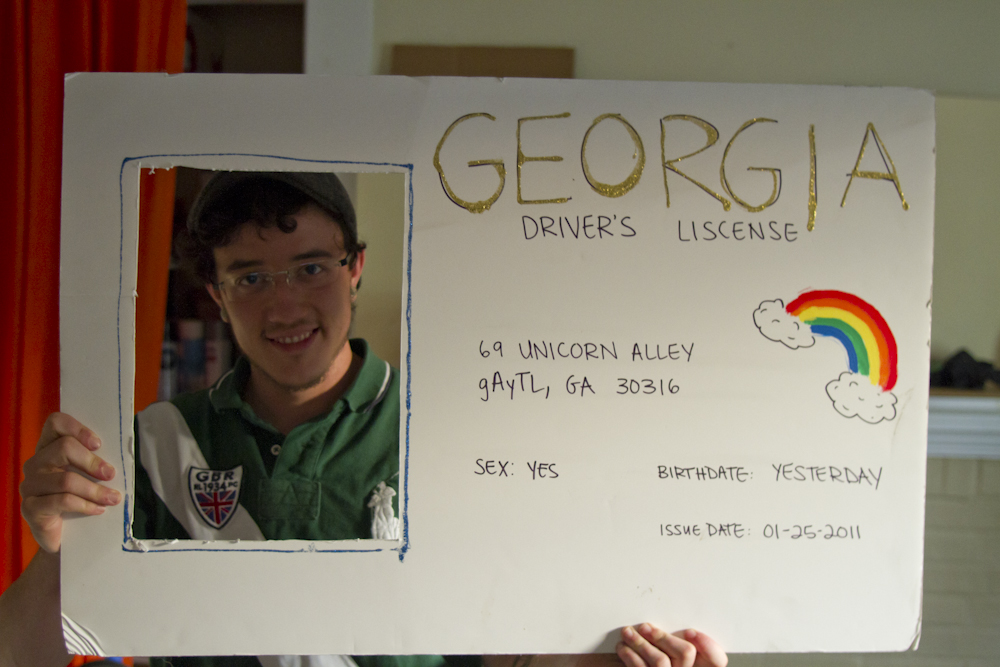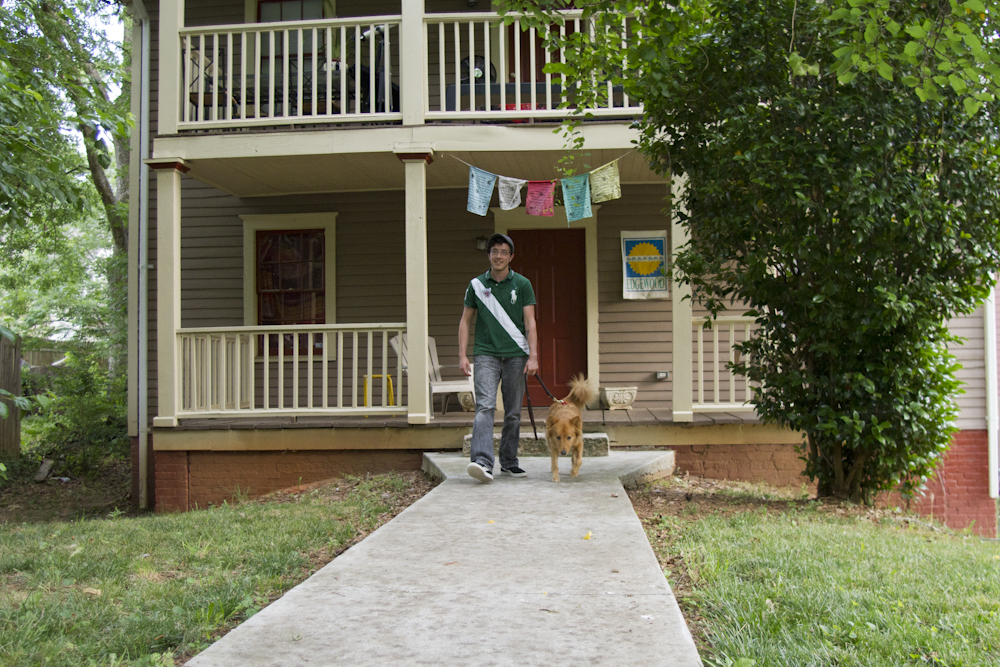
Just don't use pronouns in public. That's what C.G. usually tells his mother before they go out. Just call me by my nickname.
G. is not obsessed with grammar, but being born a female now living as a male, makes common pronouns like “he” and “she” a complicated issue. The transgender distinction is one that even the most shunned of the gay and lesbian community will often agree has the hardest plight of the oft-embattled LGBT community.
“Being transgender confuses people; it’s harder for people to grasp,” insists G., a 24-year-old from Atlanta, who prefers to be referred to by male pronouns. “People can more easily grasp the concept of gay or lesbian – being sexually attracted to someone of the same sex – but transgender is often an abstract concept to many people.”
Em Elliott, a field organizer for Georgia Equality and the Georgia Safe Schools Coalition -- Atlanta-based non-profit organizations that played an integral role in helping get critical school bullying legislation passed in the state Legislature last year -- says popular culture plays a major role.
“Transgender people have a lot more stigma working against them,” she says. “Over the years there’s been a lot more gay and lesbian characters on TV and in movies, but transgender people are rarely shown, and when they are they’re not usually shown in a positive light. People are afraid of it and they don’t want to know more about transgender people.”
Anneliese Singh, a University of Georgia (UGA) researcher who specializes in transgender issues, says gender identity and sexual orientation are often confused.
“Gender identity is how you identify your gender, versus gender expression which is how you express that gender,” she explains.
G.’s story is typical of others who identify as transgender, an estimated 700,000 people in the United States, according to a recent UCLA study. (C.G. requested that only his initials be used.)
G. first noticed an attraction to females at the age of 15, when a close friendship with a female classmate two years older evolved into a romantic attraction.
“I was kind of like, ‘this is pretty interesting and strange; maybe I’m gay,’” recalls G., then living as a female in rural Richmond Hill, Ga., a small town about a 30-minute drive from Savannah.
It didn’t take long for G.’s parents to catch on. When they confronted her about the relationship, he confirmed being romantically linked to the friend. The news didn’t go over well with them, both die-hard military brass living in a small town.
While deep-seeded emotions of anger, resentment and denial were simmering at home among her parents, the predicament at school reached all-out inferno status. Her secret got out and she was unwittingly shoved out of the proverbial closet for all to see. Many LGBT people describe “coming out” to family and friends as an arduous ordeal, but being the first openly lesbian student at her high school in the Deep South was especially agonizing, insists G.
“People would walk by my desk and purposely hit me in the head with books and none of the teachers did anything to stop it,” recalls G. “One time somebody carved the words dyke and faggot into my car door with keys. It was horrible. I was depressed and suicidal all throughout high school.”
G. contends that his experience was just one example of how transgender people are disproportionately victims of discrimination, violence and hate crimes. Young people are particularly vulnerable in schools nationwide, he says.
A 2009 national school climate survey of 7,261 LGBT middle and high school students youth conducted by the Gay, Lesbian and Straight Education Network (GLSEN), a national LGBT advocacy group, supports that view. It found that:
- 63 percent reported hearing negative remarks about gender expression (such as not acting “masculine enough” or “feminine enough”) frequently or often at school.
- 61 percent felt unsafe at school because of their sexual orientation; 40 percent because of how they expressed their gender.
- 85 percent reported being verbally harassed (e.g., called names or threatened) at school because of their sexual orientation; 64 percent felt it was due to their gender expression.\
- 40 percent said they were physically harassed at school in the past year because of their sexual orientation; compared to 27 percent because of their gender expression.
Georgia statistics are similar. Of the 175 LGBT student poll respondents, many reported having experienced physical harassment and physical assault:
- 9 out of 10 reported being physically harassed because of the way they expressed their gender; about 2 in 3 reported being physically assaulted (e.g., punched, kicked or injured with a weapon) because of their sexual orientation.
Singh, the UGA researcher, agrees with G.
“There are considerably less resources available for transgender people in schools and that can make it an especially difficult experience for them,” Singh says. “Fortunately, along with the many challenges they also have a lot of resilience; that resilience keeps them bouncing back. We need to do more in schools to support them.”
It got to a point, G. says, that for safety reasons he arrived at school early and left late in hopes of thwarting further confrontations and harassment.
“I didn’t feel safe,” remembers G. “There was no GSA (gay student alliance) at my school and only one teacher offered any kind of support.”
For these reasons, G. is an ardent supporter of Georgia’s new anti-bullying law passed by the state Legislature in 2010. Starting in August, schools must begin notifying parents when their child is bullied or bullies another. The current policies in local school districts don’t require notification in every case.
Elliot, the field organizer for the non-profits, says the measure is a huge success for Georgia students, particularly those who are LGBT.
“This goes a long way to promote a safe environment in schools,” she says. “This legislation was inspired by the suicide of DeKalb County [Georgia] student Jaheem Herrera, who was relentlessly teased and called gay at his school. That case put a lot of pressure on the state Legislature to address this issue. The bullying policies had not been updated since the 1980s. Jaheem’s ordeal gave us the push that we needed to get it passed.”
The new law:
- Defines bullying more broadly than before.
- Requires local school systems to adopt policies on dealing with bullying.
- Expands the policies to include elementary school students, particularly kindergarten.
- Requires parents to be notified any time their child is bullied or bullies someone else.
- Mandates students who bully in grades six through 12 be placed in an alternative school after the third offense.
G. says having such a law in place during his school days could have made a huge difference.


“This law is really important for Georgia,” he notes. “Bullying is an education issue; it’s about understanding that bullying should not be tolerated – especially not in schools. Teachers need to realize that it is their duty to advocate for the victims and to speak out and report this type of behavior.”
Elliott says along with providing much-needed support for students, this law also endows teachers with important powers.
“It gives support to teachers to step in when they see bullying without the fear of losing their jobs,” she says. “It helps teachers to get involved without the fear that they will be perceived as being supportive of certain issues for stepping in.”
G. lived openly as a young lesbian woman throughout high school and for two years at the University of South Carolina.
“I’d gotten teased so much for being too masculine, so I reverted to extreme femininity,” he remembers. “I wore lots of dresses and make up. I felt like I was putting on a mask every day. I had an inkling that something still wasn’t right, but I felt pressured to change who I was.”
The missing piece of her gender identity puzzle became more apparent once she transferred to UGA and joined its Lambda Alliance, an LGBT advocacy group. The experiences and feelings shared by several transgender members resonated strongly.
“I finally had the language to describe how I was feeling,” he says. “I’d hear their stories and think, ‘that sounds a lot like me; that sounds like how I feel.’ I realized that I was not a lesbian, I’m actually a male in a female body.”
G. gradually began transitioning back into a more masculine look, but camouflaging her feminine features on her petite curvy frame, made the process difficult in public.
“It was tough because sometimes I was identified by other people as male and sometimes I was identified as female,” says G. “There were times I was in the woman’s bathroom and told to leave; other times I was in the men’s bathroom and asked to get out. It’s a very dangerous situation.”
Hormone replacement therapy – weekly testosterone injections administered in his thigh – for the past two years has accelerated the transition from she to he. G. no longer gets mistaken for female.
“The body reacts rapidly to the hormones; basically you go through a second puberty,” he says. “My voice started to drop, I slept all the time and I was really horny. My body fat distribution changed dramatically, my chest flattened out, my curviness went away and my hands and feet got bigger.”
The dark brown goatee and moustache he now sports is just six months old, he notes proudly. They compliment his hairy arms and legs and bushy eyebrows, all of the same hue.
G. says he doesn’t hanker for the days when just to interact with his family he felt forced to change out of men’s clothes into female ones – down to the underwear “just in case my mom did my laundry,” he says.
He does, however, miss interacting with his dad and brother. Both have shut down all communication with him since his transition. His mom and sister still struggle with his new identity, but they do talk weekly. Mom still refers to him by his female birth name, which he politely declines to share with us.
G. says he has done what he can to help his family embrace his life choice. At one point, even creating a website dubbed “Gendersaurus Rex” for them to view his transition through photos and audio “voice” clips.” The acceptance process has been slow for his immediate family, but the extended family has been supportive.
For what attitudes he can’t change in his own family, the self-proclaimed “activist” works tirelessly to raise awareness in the greater Atlanta community. He makes a living as a paralegal with Lambda Legal, a law firm that specializes in LGBT rights issues. He was even featured in a scene from Chaz Bono’s (child of singers Sonny Bono & Cher) transgender themed documentary Becoming Chaz. Bono was filmed speaking to G. and others at Southern Comfort, an annual transgender conference held in Atlanta, purportedly the largest of its kind in the world.
He legally changed his name to C. last year. A light stroke of White Out craftily obscures the “F” signifying his gender on his Georgia driver’s license. G. has no plans to undergo the full gender reassignment surgery. He does, however, hope to have a hysterectomy and reconstructive chest surgery in the near future though, to remove the breast tissue and excess skin. He’s secured health insurance through his job that will pay for the bulk of the $5,000 - $10,000 price tag. He’s saving money now for the additional cost of traveling to Ohio to be treated by a surgeon who specializes in the procedure. Until then he’ll hold off on going shirtless in public. He wears a constrictive garment under his clothes, similar to a woman’s sports bra (“but much tighter,” he contends) to flatten out his chest.
He’s optimistic that his family members will eventually become more accepting of him and his decision to live as a male. It’ll take time, but they’ll come around, he predicts.
“I love them very much, but there came a point in my life where I realized that I can’t go on living my life as a girl; I can’t go on living my life for anyone but me.”
-- Continue to photo gallery -->
-- Jump to From the Staff: The ABCs of LGBT -->
-- Jump to Ideas and Opinions: Ty Cobb on Safe Schools for LGBT Youth -->
--Jump to Joshua Lehrer's photo exhibition "Becoming Visible" at PhotoPhilanthropy-->
[This is Part 3 of 3 a part series on LGBT issues. Visit this page for all the updates.]
Photography** by Clay Duda, JJIE.org.

Lambda Legal’s toolkit for transgender and gender non-conforming students is available online here: http://www.lambdalegal.org/publications/bending-the-mold/order-bending-the-mold.html
[nggallery id=11]
-- Jump to From the Staff: The ABCs of LGBT -->
-- Jump to Ideas and Opinions: Ty Cobb on Safe Schools for LGBT Youth -->
[This is Part 3 of 3 a part series on LGBT issues. Visit this page for all the updates.]
Photography** by Clay Duda, JJIE.org.
http://wp.me/pnQPn-1l…you can click on my name or here.
I have written a “TG state of the union” report that discusses our plight. I hope it helps give strength to others. Way to go Conner!